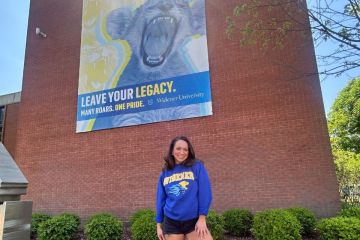Clinical Psychology Students Advocate for Teachers amid Vaccine Roll-Out

Doctoral clinical psychology students and faculty are lending their voices to advocate alongside the Delaware County public school system in a push to address COVID-19 vaccination eligibility for local educators.
As trained school psychologists, we feel that we have a responsibility to not only partner with the community but, when it’s appropriate, we need to also advocate for those in need. —Matthew Siegel, a fifth-year clinical psychology student
The outreach began in response to the Garnet Valley School District Superintendent Marc Bertrando’s efforts to call attention to the issue, citing the urgency to prioritize teachers for COVID-19 immunizations in order to reopen schools safely.
“We thought it was important to partner around the safe reopening of schools and to provide our support for teachers, administrators, and school personnel,” said Jacqlyn Zarabba, assistant professor and director of the school psychology certification program in the Institute for Graduate Clinical Psychology.
The call to action prompted the program’s school psychology research group, which was working to investigate stress and anxiety levels among students at Delaware County high schools, to identify ways get involved.
The lack of full-time in-person learning has contributed to a number of stressors for students at every level such as difficulty learning, declining mental health, food insecurity, and at times an increased risk of abuse.
“Right now mental health in the community is really poor, especially in the school community. That only gets better when a sense of normalcy returns, and that only happens if we start prioritizing not only teachers, but educators in general,” said Siegel.
The student group identified elected officials and government agencies to lobby through letters of advocacy. Calling upon local officials and other stakeholders to take action demonstrated how the students can expand their role within the community.
Throughout these years I’ve learned to advocate for mental health awareness and to advocate for our communities, because you’re not just working with one individual or one family, everyone is part of a system and it’s really on us as mental health professionals to do the best work that we can in a global context…and to do it fearlessly. —Jolie Pepperman, a fourth-year student on the school psychology track
Community engagement and experiential learning is a cornerstone of the powerhouse program. Students are placed into internships and practicum during each of the program’s five years. This integration into local organizations and businesses allows students to understand their roles as clinical therapists in the communities and the larger systems that they serve.
“This was a really lovely opportunity for us to teach our students how to juggle the multiple roles they hold as psychologists living and working in a community, to not only deal with the child in front of them but also to think about what are their responsibilities in the system. It allows us to do some didactics on advocacy, which is an important addition to our curriculum,” said Mary Rourke, associate professor and director of the Institute for Graduate Clinical Psychology.
Among the agencies and officials petitioned was State Senator John Kane who responded to a number of students acknowledging their concern and detailing his office’s efforts to address the county’s vaccine distribution process.
In March, after efforts from concerned parties including this group of graduate students, Pennsylvania Governor Tom Wolf announced that public and private k-12 school employees, including teachers, would be the next group eligible for the vaccine.
“This is a really great way to practice that value [of advocacy] and get more students involved,” said fifth-year student Leanne Scharr. “I think this is an important way for psychologists to lend their expertise in promoting systemic change.”
Leanne added that she will carry the experience with her into her career.
I hope to gain more confidence in my voice as a professional and understand the more ways that I can use my voice to give a voice to others who might need it. Speaking with and for children, students, and families and collaborating with stakeholders in a way that is effective. —Leanne Scharr
The students plan to continue to build upon the campaign and develop next steps with stakeholders, whether big or small.
“It’s hard to stand by knowing that these kids and this school community are struggling,” said Pepperman.
“We can do something as small as sending letters out, which hopefully is just the start.”



